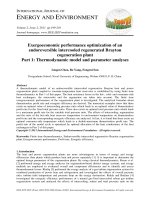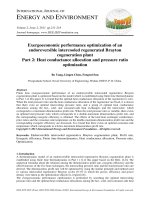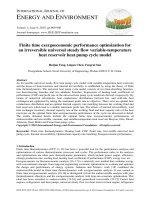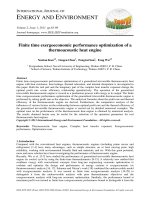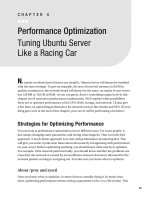MySQL performance optimization
Bạn đang xem bản rút gọn của tài liệu. Xem và tải ngay bản đầy đủ của tài liệu tại đây (245.03 KB, 115 trang )
MySQL Performance Optimization
By Peter Zaitsev, Percona Ltd
About Speaker
• Peter Zaitsev
• Co-Founder Percona Ltd
• Company specializing in MySQL and LAMP
Performance Optimization
• Spent 4.5 years with MySQL AB
• High Performance Group Manager
About Presentation
• Overview of MySQL Optimization
• Server Settings
• Queries and Schema
•
•
•
•
Operating System and Hardware
Optimum application architecture design
Deployment and Operations
Optimization Methodology
Question Policy
• Ask your short questions at once
• Keep longer questions to the end
• Feel free to ask them during conference
breaks etc
Start with installation
• Binary releases from MySQL are best
• This may change with new release policies
• OS Vendors binaries may be outdated
• Or sometimes wrongly built
• Compiling on your own make sure you do it
right
• Compiler and library bugs are common causes
for problems
Do not use Default Configuration
• Default MySQL Configuration is Tiny
• Using some 16MB of Memory
• Designed to run as secondary task on the
system
• Start with one of MySQL Sample configs
provided
• Better than default but still need tuning
Know your application
• How many connections are you going to
have ?
• Are you using MyISAM, Innodb ? Mix ?
• Are you going to run complex sorts or
group by queries ?
• Can you afford to lose data on the crash ?
• What is your working set
• Data you access most frequently
Look at SHOW STATUS
• SHOW [GLOBAL] STATUS great way to see
what is happening on low level
• Many Status counters show what needs to
be adjusted
• FLUSH STATUS; <query> SHOW STATUS
• Great way to profile query in MySQL 5.0
Status Variables
• Com_XXX
• What is happening on Command level
• Are you getting more inserts or selects ?
• Does NOT tell about query complexities
• Connections
• Number of connections. Connection creation
is relatively expensive
•
Temporary Objects
• Created_tmp_disk_tables,Created_tmp_
files,Created_tmp_tables
• Temporary objects can be expensive
• Check if queries can be optimized first
• tmp_table_size can be increased to reduce
number of tables created on disk
• In some cases, ie BLOB/TEXT fields this does not
help
Handler Statistics
• Handler_XXX
• Low level row operations
• Lookup by index, full table scan, inserts, deletes
• Good measure of load
• Rows also can be different though
• Show if indexes are adequate
• Check how query was really executed
• EXPLAIN plan and estimates can be incorrect
Storage engine related
• Innodb_XXX
• Innodb statistics since MySQL 5.0
• Mainly duplicates one from SHOW INNODB
STATUS
• Key_XXX
• Key Buffer activity metrics for MyISAM tables
• High amount of misses
(Key_reads/Key_Writes) – consider increasing
Status Variables (5)
• Max_used_connections
• Highest number of connections used
• If matches Max_Connections you probably ran
out of connections at some time.
• Opened_tables
• Table Cache efficiency. Do not allow to grow
more than 1/sec or so
• Table opens can be rather expensive
Query Cache
• Qcache_XXX
• Query Cache Statistics
• Query Cache Efficiency
• Qcache_hits - Served from query cache
• Qcache_inserts - Query Cache Writes
• Com_Selects - Selects which were executed
• First is “benefit” last two are “overhead”
• Qcache_lowmem_prunes
• Low on Qcache memory or fragmentation
Status Variables (7)
• Questions
• Number of questions server has handled
• Simple load metrics, especially for constant query
mix.
• Select_full_join
• Joins done without indexes. Should be 0 in
most cases
• Select_scan
• Full table scan queries
Status Variables (8)
• Slow_queries
• Queries logged in slow query log
• Taking longer than long_query_time sec or
(configurable) doing full table scans
• Sort_merge_passes
• Disk based sorts
• Consider increasing sort_buffer_size
• and look at query optimization
Status Variables (9)
• Table_locks
• MySQL Level table locks information
• Applies to MyISAM, MEMORY etc
• Table_locks_immediate
• Table lock equests succeeded without a wait
• Table_locks_waited
• Requests which had to wait
• No information about wait time available in status
variables.
Threads
• Threads_cached
• Number of threads kept in thread cache
• Threads_connected - Current connections
• Threads_running
• Connections currently active. High number
means overload
• Threads_created
• Threads physically created. Cache misses.
General tuning tips
• Memory buffers are very important for
performance
• innodb_buffer_pool_size, key_buffer_size
• Balance appropriately between storage
engines
• Note Innodb performance is more affected by
buffer sizes than MyISAM.
• Do not waste memory if DB size is small
Do not allocate too much
memory
• Using less memory than available reduces
performance
• Using more memory than you have can
lead to even worse performance or crashes
• Never let your DB box to swap actively
• Some swap space allocated is OK, watch IO
• Never let MySQL to run out of memory
• Or address space on 32bit boxes.
Use proper unit for variables
• Table_cache=512
• Not thread_cache=512K
• It is measured in entries rather than bytes
• key_buffer_size=32M
• Size is given, not number of blocks
Do not use overly large values
• Do not just scale values from sample
config file
• Config sample for 1GB has X variable =1M
• I have 16GB so I set it to 10GB
• Use values you need. Larger values may
decrease performance
• sort_buffer_size of 512K will be faster than
16M for small sorts.
Consider per session variables
• Optimize global variables for your common
queries.
• If you have one query which needs to do
large sort DO NOT set sort_buffer to 16M
• Do
• SET sort_buffer_size=16000000;
• Run Query
• SET sort_buffer_size=DEFAULT;
Do not expect magic from
settings tuning
• For most workloads changing 5-8 variables
from defaults is enough
• Tuning rest affects performance few
percents
• Changing other variables has similar effect
• Order of magnitude or better
improvements normally come from
Schema and Query tuning
Innodb Configuration
• MyISAM has decent performance with
defaults, Innodb will crawl.
• Speeding Up Innodb in two minutes:
• Increase innodb_buffer_pool_size
• Increase innodb_log_file_size
• Configure innodb_flush_logs_at_trx_commit
• Set it to 2 if you can afford losing committed
transactions (ie moving from MyISAM)
